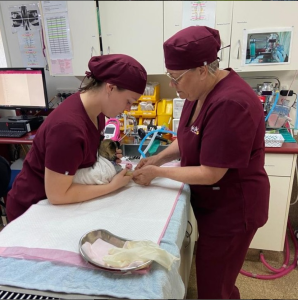The Benefits of Desexing Your Puppy
Desexing, or castration in male dogs and spaying in female dogs, is a surgical procedure to remove the reproductive organs. It is a standard and safe procedure recommended by veterinarians for most puppies.
There are many benefits to desexing your puppy, including:
- Preventing unwanted litter. One of the most important reasons to neuter your puppy is to prevent unwanted litters. Dogs can reach sexual maturity as early as six months of age, so desexing them before this time is essential.
- Reducing the risk of specific health problems. Desexing can help to reduce the risk of particular health problems in both male and female dogs. For example, desexing female dogs can reduce the risk of mammary cancer, ovarian cancer, and uterine infections. Neutering male dogs can reduce the risk of testicular cancer and prostate problems.
- Improving behavior. Desexing can also help to improve behavior in some dogs. For example, desexing male dogs can reduce aggression, roaming, and urine marking. Spaying female dogs can reduce heat cycles, making them less restless and distracted.
- Increasing lifespan. Studies have shown that desexed dogs tend to live longer than intact dogs. This is likely because neutered dogs are less likely to develop specific health problems like cancer and reproductive disorders.
When to Desex Your Puppy
The best time to desex your puppy is between 6 and 12 months. However, puppies can be fixed as early as six months of age, and some veterinarians may recommend desexing large breed dogs at an even younger generation.
The Desexing Procedure
The desexing procedure is a minor surgery usually performed under general anesthesia. The veterinarian will make a small incision in the abdomen to remove the reproductive organs. The incision will then be closed with stitches or surgical glue.
Aftercare
Most puppies recover from desexing surgery within a few days. However, it is essential to follow your veterinarian’s instructions for aftercare. This may include:
- Restricting your puppy’s activity for a few days
- Keeping the incision clean and dry
- Checking the incision for signs of infection
- Preventing your puppy from licking or chewing at the incision
The Benefits of Desexing for Your Puppy
Here are some of the specific benefits of desexing for your puppy:
- Female puppies:
- Reduced risk of mammary cancer
- Eliminated risk of pyometra (a life-threatening infection of the uterus)
- Eliminated risk of ovarian cancer
- Reduced risk of heat cycles
- Reduced risk of false pregnancies
- Male puppies:
- Reduced risk of testicular cancer
- Reduced risk of prostate problems
- Reduced risk of roaming and aggression
- Reduced risk of urine marking
The Benefits of Desexing for You
In addition to the benefits for your puppy, desexing also has some help for you, including:
- Reduced cost of pet ownership. Desexed dogs are less likely to require veterinary care for specific health problems like cancer and reproductive disorders. This can save you money on veterinary bills in the long run.
- Increased peace of mind. Knowing that your puppy is less likely to develop specific health problems and behavioral issues can give you peace of mind.
- A better companion. Desexed dogs are often more calm and affectionate than intact dogs. This can make them better companions for you and your family.
Conclusion
Desexing is a safe and effective way to improve your puppy’s health and well-being. It is also a responsible way to help control the pet population. If you are considering getting a puppy, talk to your veterinarian about the benefits of desexing.
Additional Considerations
Here are some additional considerations about desexing your puppy:
- Some risks are associated with desexing surgery but are very low. The most common hazards include bleeding, infection, and reaction to anesthesia.
- Desexing can cause some changes in your puppy’s body composition and metabolism. For example, desexed dogs may be more likely to gain weight. It is essential to feed your desexed puppy a healthy diet and provide them with regular exercise.
- Desexing does not eliminate all behavioral problems. However, it can help reduce the risk of behavioral issues, such as aggression and roaming. If your puppy has behavioral problems, it is essential to work with a qualified trainer to address them.
Conclusion
Desexing is a safe and effective way to improve your puppy’s health and well-being. It is a responsible way to help control the pet population, and it has many benefits for



